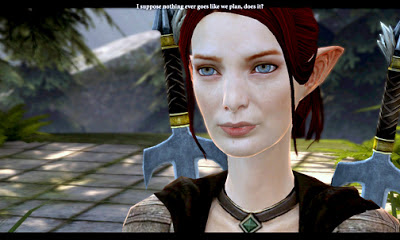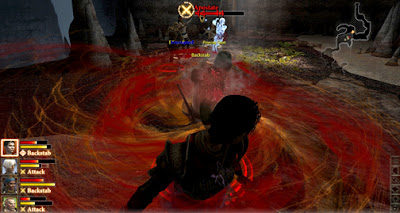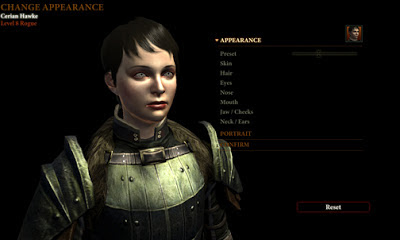 |
| ARGH! |
If I had a bone to pick with Dragon Age 2 (and I certainly have a few of those) then the doors-that-are-not-doors" would be a major issue for me. This playthrough I told myself that I would place my pet peeves on the back burner and just experience the game for what it is. The faux doors would not annoy me this time. That conviction only lasted until the end of Act 1 when I chose to complete the Secondary Quest Magestrate's Orders.
Magestrate's Orders requires Hawke to enter an abandoned ruin (which suspiciously resemble the Deep Roads) in order to retrieve an "escaped criminal". These ruins largely consist of one primary pathway orbiting a circular chamber with a number of side corridors and chambers. At first glance the ruin's floor plan seems to give players a choice. You can choose to explore every nook and cranny before heading towards the quest maker, or you can simply focus on the quest and disregard any kind of exploration. I, being rather anxious to complete this side quest and close out Act 1, was opting for the later. Plus, it was getting late and I was very tired. A quick in-and-out seemed the way to go. Dragon Age 2, however, disagreed.
In short, the ruin's map lies. Despite the central chamber having four entry points, only one of those "entrances" actually functioned. The others still had doors, but the doors did not work.(see above) They were just for appearances. Instead of letting players decide which route they wished to take to the quest point, the game arbitrarily forced its own path (and thus forced exploration) instead. It seemingly offered the promise of choice, but in reality it forced linearity.

This map illustrates the path that Cerian took in her continued efforts to simply get in the ruin, collect the criminal, and get out. At the start she could either head north into a chamber which was bound to have an encounter (see first image) or she could head east down a corridor which may contain less conflict. That pass also promised a short cut to the quest point. Opting for the eastern route she promptly ran into non-door #1 and was forced to take the northern route anyways. Upon entering the chamber, there was a northern door which allowed her to continue on that same pathway, and an eastern door which led straight to the ruin's central chamber. (see first image) The latter was more expedient, but it too was also a sham. Non-door #2 forced Cerian's crew to continue northward instead, along the outer passage. It wasn't until Hawke reached the top of the ruin, fought through numerous enemies, and triggered an important cut scene, that DA2 presented her with its only entrance to the central chamber (door #3).
Upon entering the circular chamber (one encounter + numerous spawning enemies later) Hawke was presented with two options. She could proceed immediately through the chamber's eastern door and find the criminal; or she could exit through the southern door, pass through an unnecessary hallway, and then face the alleged convict. The eastern door (#4) was an obvious choice, but it maddeningly enough was also a false door. That meant that Cerian, once again, was forced to take the most circuitous route to her destination. Interestingly enough, door #4 led to the path Cerian initially wanted to take upon entering the ruin. Door #1 was sealed though, and and she was left unable to proceed directly to the criminal's location. She has to explore the entire ruin first.

That was not the end of Hawke's frustration. After her first meeting with the convict, he ran to the circular chamber Hawke had just left. One encounter and numerous spawned enemies later, Cerian was yet again left with two options. She could take the western door which led directly to the circular chamber, or she could take the southern door and backtrack the hallway her crew had just used. The westward door (#6) was the most direct route, but it (like before) was not an option. Not only did that mean that the only way back to the circular chamber was by needlessly backtracking through a long hallway; but it also meant that this location featured a corridor between two chambers that was utterly useless. At no time during this side quest was Hawke ever able to utilize the hallway between doors #4 and #6.
It would be easy for me to try an explain these sealed "doors" away. One could say that Bioware was trying to encourage exploration, but I've never felt that exploration should be forced upon the player. Once it is made obligatory you can't really call it exploration anymore. It is simply standard gameplay. One could also say that the blocked doors prevented gamers from missing the cut scene which gave insight about the criminal's character. Yet, that point is easily countered. A simply adjustment like placing the cut scene in a common location (perhaps just inside the entrance?) would have made it possible for all gamers to trigger it no matter which path they took.
No, I honestly only see two reasons for the doors to be like this. One, it artificially extends gameplay. Block doors in enough locations, force gamers down enough circuitous routes, and the extra time really adds up. Two, the sealed entrances are a by product of the location map copy pasta action the DA2 designers were so fond of. Closing off some entrances on this map, and making them available on others theoretically presents gamers with new areas (and by extension new experiences) when they are forced to play this exact map again hours later.
No matter how you cut it though, this kind of design is absolutely inexcusable. Doors should never be used for mere aesthetic purposes. If it can't be used, replace it with a wall. Likewise, maps and mini maps are an important part of gameplay, especially for those of us who are seriously directionally challenged. Repeatedly depicting rooms and corridors on a map, which are 100% inaccessible, causes people like me to become turned around, confused, and altogether frustrated. Getting lost in an open world game like Morrowind is one thing. That is an expected part of gameplay which, in my opinion, serves to enrich the overall experience. Getting turned around in locations like this, however, is complete nonsense. Do not provide a location map if it cannot be trusted. That is bad form. Don't do it.























